
Hi! My name’s Kwabena and I’m in my first year studying History and Politics at Oxford. I chose the course because I’d always been interested in politics and current affairs whilst growing up. I always had my eyes glued to the news, and I enjoyed analysing and talking about local and global issues, which came to be an important skill when I first studied History at A-Level. From this, I knew a combination of the two subjects was for me.
As with many other humanities subjects, the course doesn’t tend to have a lot of contact hours – for me, normally it would alternate between 1 and 2 tutorials a week, with essays to prepare for each tutorial. This therefore means that normally I would receive at least 3 essays a fortnight, which sounds like a lot, but is actually super manageable, plus there is plenty of time for extra-curricular activity or just for relaxing. Lectures, on the other hand, are not compulsory, but if you do choose to go to them, there are normally at least 4 lectures a week, split into 2 for History and 2 for Politics. There is a lot of flexibility; your time is mostly up to you, so it’s easy to fit work around other commitments that you have, which in the long run is a vital life skill.
Seeing as I initially never expected to even get an interview, I spent a lot of my time worrying about what it would be like and whether I would be prepared enough. However, the actual interview experience for me was really stimulating. I got to talk about two subjects that I was really interested in with interviewers who were experts in them, and although it was very full on at first, with the interviewers immediately beginning with the topic of the interview, I found that my nerves went away and I really eased into the conversation. Generally, the tutors will normally want to ask questions based on either your written work or your personal statement in the interview, so I would highly recommend looking over these and thinking of questions that you could be asked based on them. For History, they may give you an extract on a random historical topic to analyse, and as for Politics, you could find yourself discussing and trying to get to grips with a certain political theory or concept. The best thing to do throughout the interview period is not only to listen, but to think out loud and allow the interviewers to look into your thought processes.
Overall, I really enjoy studying my course and I think it’s important for prospective applicants to know that although applying to Oxford might seem like a long shot, the only way you are guaranteed not to get in is if you don’t apply!
